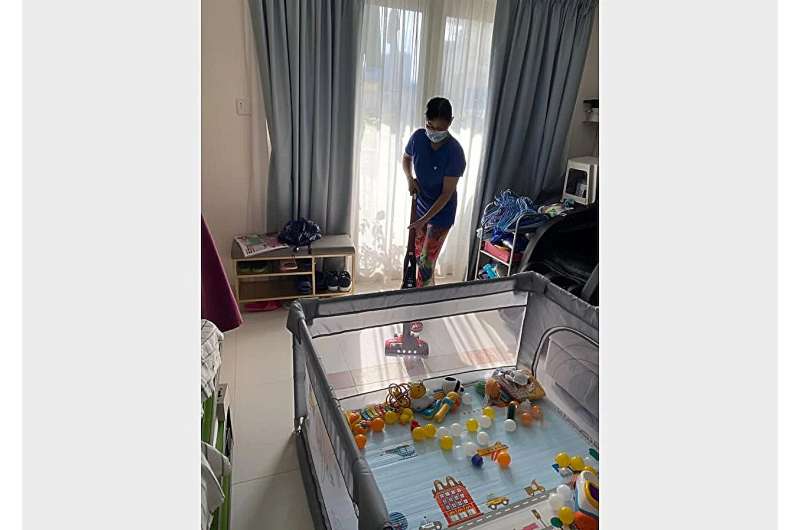This article has been reviewed according to Science X's editorial process and policies. Editors have highlighted the following attributes while ensuring the content's credibility:
fact-checked
proofread
Study reveals unfair representation of migrant domestic workers in mistreatment cases in Chinese media

Most Chinese-language media reports concerning migrant domestic workers (MDW) in Hong Kong fail to report their mistreatment factually, independently and critically, and focus on news appeal while neglecting the deeper roots of this important issue, related to power and the interplay of gender, race, ethnicity, and class, according to a recent study by Lingnan University.
These news stories distance the community from the sufferings of MDW, reinforcing inequalities, and inhibiting any discussion that might lead to improved policies, practices and awareness.
Most Chinese-language media reports concerning migrant domestic workers (MDW) in Hong Kong fail to report their mistreatment factually, independently and critically, and focus on news appeal while neglecting the deeper roots of this important issue, related to power and the interplay of gender, race, ethnicity, and class, according to a recent study by Lingnan University.
These news stories distance the community from the sufferings of MDW, reinforcing inequalities, and inhibiting any discussion that might lead to improved policies, practices and awareness.
From 1974, the Hong Kong government allowed residents to employ foreign domestic workers, leading to an influx of MDW from the Philippines. With the expansion of the middle class in Hong Kong and increased demand for full-time, live-in domestic helpers, the number of MDW grew from 21,500 in 1982 to more than 385,000 in 2020, around 5% of the total population.
However, despite their increasing numbers over the past five decades and their notable contribution to local families, many MDW in Hong Kong are still subject to prejudice and mistreatment, just like "muijai" or amahs decades ago. A poll conducted by the NGO Mission for Migrant Workers in 2017 revealed that a significant number of MDW respondents have reported either physical (18% of respondents) or sexual abuse (6%).
In order to better understand Chinese-language media representations of MDW in Hong Kong, and their wider significance and effects on societal perceptions of MDW issues, Prof Janet Ho Nga-man, Head of Department of English and Prof Andrew Sewell, Associate Professor of Department of English, embarked on a project analyzing MDU mistreatment reports in the Chinese-language media.
They read 398 reports published between 2010 and 2019 in three popular Chinese-language newspapers, and examined the discursive representations of perpetrators and victims in the reports. The study placed media discourse within a broader sociological framework in order to highlight its important role, and to stress the inherent intersectionality of MDW issues.
To understand the relationship between issues such as discrimination, power differentials, and mistreatment in their social context, Professor Ho and Professor Sewell employed conceptual tools of social control and structural inequality. Social control refers to the processes, approaches, and resources for imposing order on individuals, so that their behavior conforms to moral norms and expectations. Structural inequality may occur in the form of exploitation, penetration, fragmentation, and marginalization.
The study identified three significant points in the way the MDW and their employers were discursively portrayed in the news reports. First, the reports tended to exonerate perpetrators and blame victims. This inevitably contributed to the power imbalances and further marginalization of MDW. For example, in the physical abuse cases, positive personality traits (a responsible wife) or contributory factors (employers' emotional stress and mental illness) were often highlighted, showing perpetrator exoneration.
The reports also tended to focus on either negative personality traits (laziness or incompetence) or contributory factors (unsatisfactory performance), revealing widespread victim blaming. When perpetrator exoneration and victim blaming worked in tandem, the severity of the mistreatment would be downplayed, and MDW put in a disadvantaged position.
Second, through narrativization, the media gave the stories a familiar cognitive frame of interpretation, encouraging readers to attribute causes of mistreatment to perceived shortcomings of the MDWs. For example, the mother was stressed because her children were at school, and the helper was lazy, so the mother physically assaulted the helper. This, to a certain extent, encouraged moral evaluation and legitimated the mistreatment of the MDWs.
The third main point of these media reports was sensationalism—presenting information so as to gain readers' attention and provoke an emotional response. For example, in a sexual abuse case, most media reports included detailed descriptions, so that they read like erotic or sensationalist stories. These oversimplified, overly sexualized narratives inevitably served to misrepresent the issues and people involved, increasing the scope for perpetrator exoneration and victim blaming, as well as perpetuating harmful stereotypes and structural inequalities.
The study noted that the way MDW mistreatment was framed in Hong Kong's Chinese-language news reports, and the discursive representation of both perpetrators and victims contributed to community-wide stereotypes about MDW, while maintaining existing relations of employer dominance, as well as social control and structural inequality, which in turn set the stage for continued domestic abuse. In fact, social exclusion and stigmatization of Filipinos and Indonesians are still common in Hong Kong.
The report also highlighted the need for researchers to engage with journalists and the general public to challenge negative representations and fight discrimination. While the media has to care about its readership, it should bear some responsibility for better societal understanding of MDW mistreatment and facilitate improved policies, practices and awareness.
Provided by Lingnan University




















